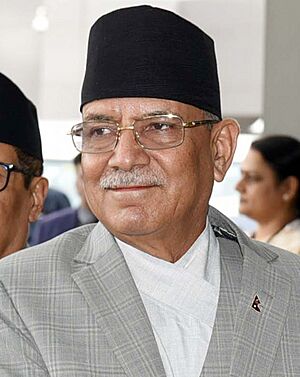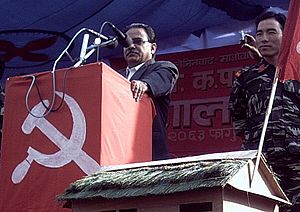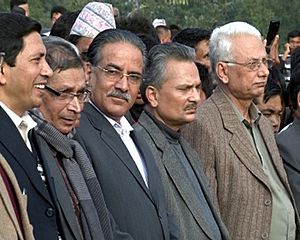Pushpa Kamal Dahal facts for kids
Quick facts for kids
Pushpa Kamal Dahal
|
|||||||||||||||||||||||||||||||||||||||
|---|---|---|---|---|---|---|---|---|---|---|---|---|---|---|---|---|---|---|---|---|---|---|---|---|---|---|---|---|---|---|---|---|---|---|---|---|---|---|---|
|
पुष्पकमल दाहाल
|
|||||||||||||||||||||||||||||||||||||||

Dahal in 2023
|
|||||||||||||||||||||||||||||||||||||||
| Leader of the Opposition | |||||||||||||||||||||||||||||||||||||||
| Assumed office 15 July 2024 |
|||||||||||||||||||||||||||||||||||||||
| President | Ram Chandra Paudel | ||||||||||||||||||||||||||||||||||||||
| Prime Minister | KP Sharma Oli | ||||||||||||||||||||||||||||||||||||||
| Preceded by | Sher Bahadur Deuba | ||||||||||||||||||||||||||||||||||||||
| In office 11 February 2014 – 11 October 2015 |
|||||||||||||||||||||||||||||||||||||||
| President | Ram Baran Yadav | ||||||||||||||||||||||||||||||||||||||
| Prime Minister | Sushil Koirala | ||||||||||||||||||||||||||||||||||||||
| Preceded by | Ram Chandra Paudel | ||||||||||||||||||||||||||||||||||||||
| Succeeded by | Sushil Koirala | ||||||||||||||||||||||||||||||||||||||
| In office 25 May 2009 – 6 February 2011 |
|||||||||||||||||||||||||||||||||||||||
| President | Ram Baran Yadav | ||||||||||||||||||||||||||||||||||||||
| Prime Minister | Madhav Kumar Nepal | ||||||||||||||||||||||||||||||||||||||
| Preceded by | Girija Prasad Koirala | ||||||||||||||||||||||||||||||||||||||
| Succeeded by | Ram Chandra Paudel | ||||||||||||||||||||||||||||||||||||||
| 33rd Prime Minister of Nepal | |||||||||||||||||||||||||||||||||||||||
| In office 26 December 2022 – 15 July 2024 |
|||||||||||||||||||||||||||||||||||||||
| President | |||||||||||||||||||||||||||||||||||||||
| Deputy |
|
||||||||||||||||||||||||||||||||||||||
| Preceded by | Sher Bahadur Deuba | ||||||||||||||||||||||||||||||||||||||
| Succeeded by | KP Sharma Oli | ||||||||||||||||||||||||||||||||||||||
| In office 4 August 2016 – 7 June 2017 |
|||||||||||||||||||||||||||||||||||||||
| President | Bidya Devi Bhandari | ||||||||||||||||||||||||||||||||||||||
| Deputy |
|
||||||||||||||||||||||||||||||||||||||
| Preceded by | Khadga Prasad Oli | ||||||||||||||||||||||||||||||||||||||
| Succeeded by | Sher Bahadur Deuba | ||||||||||||||||||||||||||||||||||||||
| In office 15 August 2008 – 25 May 2009 |
|||||||||||||||||||||||||||||||||||||||
| President | Ram Baran Yadav | ||||||||||||||||||||||||||||||||||||||
| Deputy | Bamdev Gautam | ||||||||||||||||||||||||||||||||||||||
| Preceded by | Girija Prasad Koirala | ||||||||||||||||||||||||||||||||||||||
| Succeeded by | Madhav Kumar Nepal | ||||||||||||||||||||||||||||||||||||||
|
|||||||||||||||||||||||||||||||||||||||
|
|||||||||||||||||||||||||||||||||||||||
| Personal details | |||||||||||||||||||||||||||||||||||||||
| Born |
Ghanashyam Dahal
11 December 1954 Lewade, Dhikur Pokhari VDC, Pokhara, Nepal |
||||||||||||||||||||||||||||||||||||||
| Political party | CPN (Maoist Centre) (1994–2018; 2021–present) | ||||||||||||||||||||||||||||||||||||||
| Other political affiliations |
|
||||||||||||||||||||||||||||||||||||||
| Spouse |
Sita Poudel
(m. 1969; died 2023) |
||||||||||||||||||||||||||||||||||||||
| Children | 4, including Renu | ||||||||||||||||||||||||||||||||||||||
| Alma mater | Institute of Agriculture and Animal Science, Tribhuvan University | ||||||||||||||||||||||||||||||||||||||
| Nickname | Prachanda | ||||||||||||||||||||||||||||||||||||||
Pushpa Kamal Dahal (born on December 11, 1954) is a famous politician from Nepal. He is better known by his nickname Prachanda, which means "fierce" in the Nepali language. He has been the Prime Minister of Nepal three different times.
Dahal has been a major figure in Nepal's politics for many years. He was a leader during the Nepalese Civil War, a period of conflict that led to big changes in the country. After the war, he helped Nepal transition from a monarchy to a republic. This means the country is now led by a president instead of a king.
In July 2024, he became the Leader of the Opposition. This is an important role in government for the leader of the main party not in power.
Contents
Early Life and Education
Pushpa Kamal Dahal was born with the name Ghanashyam Dahal in a village near Pokhara, Nepal. His family belonged to the Brahmin Hindu community. When he was eight, his family moved to the Chitwan District in southern Nepal.
As a young man, Dahal saw a lot of poverty around him, which made him interested in politics. He believed in left-wing ideas, which focus on creating more equality for people.
For his education, he moved to Kathmandu and later studied agriculture at the Institute of Agriculture and Animal Science. After finishing his studies, he worked as a schoolteacher in a village until 1979.
Leading the Nepalese Civil War

In the 1980s, Dahal became involved with communist political parties. By 1994, he was the leader of the Communist Party of Nepal (Maoist). This group believed that Nepal's government and society needed a complete change.
In 1996, his party presented the government with a list of 40 demands. These demands were about improving life for ordinary people, protecting Nepal's independence, and changing the social system. When the government did not meet these demands, the party began the Nepalese Civil War.
For ten years, Dahal led the military efforts of his party. The conflict was mainly fought in the mountainous regions of Nepal. The goal was to remove the king and create a new government that would give more power to the people.
The Path to Peace
The civil war was a difficult time for Nepal. In 2005, Dahal and other political parties began to work together. They agreed that the king's power was the main problem holding the country back.
In 2006, huge protests took place across Nepal. These protests forced King Gyanendra to give up his power and bring back the parliament. After this, Dahal's party announced a ceasefire, a temporary stop to the fighting.
Dahal and other leaders signed a peace agreement. They decided to create a new constitution and let the people decide if Nepal should remain a monarchy. This peace process ended the long civil war.
Serving as Prime Minister
Dahal has led Nepal as prime minister three times. Each time, he faced different challenges and worked with different political parties.
First Term (2008–2009)

After the civil war ended, Nepal held an important election in 2008. Dahal's party, the CPN (Maoist), won the most seats. This was a major victory and showed that many people supported their ideas for change.
In August 2008, Dahal became the first prime minister of the new Federal Democratic Republic of Nepal. During his first term, he promised to work with other parties to write a new constitution. He also told other countries, like India and China, that Nepal wanted to have good relationships with them.
He resigned in May 2009 after a disagreement with the president over the leadership of the army.
Second Term (2016–2017)
In August 2016, Dahal was elected prime minister for a second time. This was part of a power-sharing deal with another major party, the Nepali Congress.
He served for about ten months before stepping down in May 2017. This allowed the leader of the Nepali Congress, Sher Bahadur Deuba, to become prime minister as they had agreed.
Third Term (2022–2024)
After the general election in 2022, Dahal became prime minister for a third time in December. He formed a government with the support of several different parties.
During this term, he changed his political partners, known as coalitions, several times. He worked with both the CPN (UML) and the Nepali Congress at different points.
His third term ended in July 2024. He lost a vote of confidence in parliament, which is a vote to see if a leader still has the support of the majority of lawmakers.
Personal Life
Dahal married Sita Poudel in 1969. They had four children together, including their daughter Renu Dahal, who is also a politician. His wife, Sita, passed away in 2023.
Following Marxist ideas, Dahal is an atheist, which means he does not believe in a god. He stopped practicing the Hindu religion when he was a teenager.
See also
 In Spanish: Pushpa Kamal Dahal para niños
In Spanish: Pushpa Kamal Dahal para niños
 | Victor J. Glover |
 | Yvonne Cagle |
 | Jeanette Epps |
 | Bernard A. Harris Jr. |

